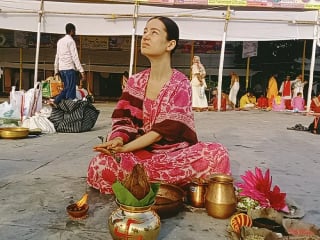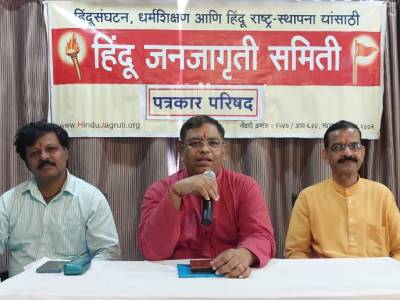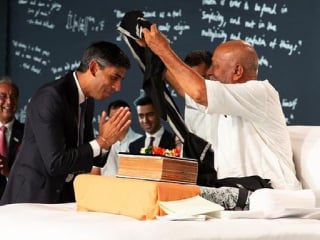Today is a "Aatmasamarpan Din" of Great Freedom Fighter Swatantravir Savarkar. HJS Salute him for his great work for country and Dharma. Every Hindu must inspire from Swatantravir Savarkar!

Vinayak Damodar Savarkar was born on May 28, 1883 into a family of jagirdars (landlords) in the village of Bhagpur near Nasik. Vinayak was one of four children others being, Ganesh (Babarao), Mainabai and Narayan, born to Damodarpant Savarkar and Radhabai. Being descendents of a line of Sanskrit scholars, the Savarkars inculcated the love of learning into their children. Vinayak and Babarao were sent to the Shivaji School in Nasik. When Vinayak was nine years old, his mother died of cholera. Damodarpant himself looked after his children thereafter.
Vinayak’s father died of plague in 1899. The burden of the family fell on Babarao’s shoulders. Vinayak’s patriotic spirit found an outlet through an organization called the Mitra Mela that he formed. Vinayak inducted young patriotic men like himself into the Mela. He encouraged the members of the Mela to strive for "absolute political independence for India" by whatever means necessary. In the event of an armed revolt the young crusaders toughened themselves through physical training. The Mitra Mela served the city of Nasik in many ways, especially during the plague when the group carried victims for cremation.
In March 1901, Vinayak was married to Yamunabai, daughter of Ramchandra Triambak Chiplunkar, who agreed to help with Vinayak’s university education. After his matriculation examination, Vinayak enrolled in the Fergusson College in Poona in 1902.
Savarkar very soon dominated campus life. He, along with a group of students began dressing alike and using swadeshi goods only. He renamed the "Mitra Mela" as "Abhinav Bharat" and declared that "India must be independent; India must be united; India must be a republic; India must have a common language and common script." In 1905, a huge Dussehra bonfire of foreign goods was lit in Poona by Savarkar and his friends to express resentment toward the partition of Bengal. Vinayak left for London to study law in June 1906 on receiving a scholarship. The "study of law," he said "shows the vital points in the system of government, and accurate base where to strike at advantage." He vowed never to take up service under the British Government and never to accept payment from them.
Savarkar stayed at the India House in London, which was established by Pandit Shyamji, a patriot, scholar and social reformer. Savarkar founded the Free India Society which held weekly meetings and celebrated Indian festivals and anniversaries of important figures and days in the Indian freedom struggle. On May 10, 1907, scuffles broke out between Indians and Britishers at the celebration of the Golden Jubilee of the 1857 martyrs organized by the Free India Society. In 1908, Savarkar completed "the History of the War of Indian Independence." The text was banned by the British even before it was published for being "revolutionary, explosive and seditious." The book was published in France and Germany later and it did much to inspire revolutionaries like Bhagat Singh and Subash Chandra Bose. In 1909, Madanlal Dhingra, follower of Savarkar, shot Sir Wyllie of the India Office after failing in his attempt on the Viceroy, Lord Curzon’s life, for the atrocities committed on Indians. Dhingra was imprisoned and a meeting of Indians in London planned to unanimously condemn his action. At the meeting Savarkar angrily shouted, "No, not unanimously!" The meeting became unruly, Savarkar’s spectacles broke and blood ran down his face. The meeting was broken up with Surendranath Banerjea leaving in protest of the attack on Savarkar. That night Savarkar wrote to the London Times to clarify the reasons for his action. He stated that the meeting had no right to condemn Dhingra like a law court.
In India, Savarkar’s elder brother led an armed movement against the Minto Morley reforms. Babarao was sentenced to transportation for life to the Andamans jail. In protest, a youth called Kanhere shot dead the British Collector of Nasik, Mr. A.M.T. Jackson. Savarkar was implicated in the murder of Mr. Jackson because of his contacts with the India House. Savarkar moved to Madame Cama’s residence in Paris. A warrant was issued and Savarkar was arrested on March 13, 1910. In his last letters to a close friend, he conveyed his plan to attempt to escape from custody at Marseilles. His friend was to be waiting there with a car. The escape attempt at Marseilles failed. The car arrived too late.
Savarkar was brought to Bombay on the S.S. Morea and detained at Yeravada jail. Savarkar was tried and found guilty on the counts of "waging war by instigation using printed matter, and providing arms… (and) for abetting the murder of Mr. Jackson (p.118, Berry)." Savarkar was awarded 25 years imprisonment on the former charge and 25 years for the latter. A sum total of 50 years imprisonment which he was to serve at the Andamans prison. "Veer" Savarkar was only 27 years old at the time of his sentencing!
Savarkar arrived at the Andamans prison on July 4, 1911. Life for the prisoners was very harsh. Savarkar’s day began at 5 a.m. chopping trees with a heavy wooden mallet and then he would be yoked to the oil mill. If prisoners talked or broke queue at mealtime, their once a year letter writing privilege was revoked. Savarkar withdrew within himself, quietly and mechanically doing the tasks presented to him. He was successful in getting permission to start a jail library. With great effort and patience he taught the illiterate convicts to read and write.
In 1920, Vithalbhai Patel demanded the release of the Savarkar brothers in the Central Legislative Assembly. Tilak and Gandhiji also appealed for Savarkars freedom. On May 2, 1921, the Savarkar brothers were brought back to India on the S.S. Maharaja.
Savarkar remained imprisoned in Ratnagiri Jail and then in Yeravada Jail until January 6, 1924 when he was freed under the condition that he would not leave Ratnagiri district and abstain from political activity for the next five years. While in Ratnagiri Jail, Savarkar wrote "Hindutva" which was smuggled out and published under the pen-name "Maharatta." On his release, Savarkar founded the Ratnagiri Hindu Sabha on January 23, 1924 which aimed to preserve India’s ancient culture and work for social welfare.
Through the Sabha, Savarkar worked hard to protect minority rights. During the celebration of Hindu festivals, Savarkar visited Muslim and Christian homes to promote good will. He encouraged intercaste marriage and assisted Dr. Ambedkar in the liberation of the untouchables. He appealed for a wider use of Hindi as the mother tongue and suggested reforms to the Devanagiri script to facilitate printing. While in Ratnagiri he wrote the "Hindu Padpadashashi" and "My Transportation for Life" and a collection of poems, plays and novels.
At the end of his five year confinement in Ratnagiri, Savarkar joined Tilak’s Swaraj Party and founded the Hindu Mahasabha as a separate political party. He warned of the Muslim League’s designs of partitioning the nation. In 1937, Savarkar was elected President of the Hindu Mahasabha. He toured the nation widely and delivered the simple message that followers of Vedism, Jainism, Buddhism and Sikhism were all Hindus.
At declaration of war by Britain on Germany and the arbitrary inclusion of India in the war, Savarkar said that Britain’s claim of safeguarding human freedom was simply meaningless.
Savarkar agreed to join hands with the Congress in support of Gandhiji’s Quit India movement as long as the Congress did not compromise the unity of the nation to the Muslim League. "The Quit India Movement must not end in a Split India Movement!" he thundered on a BBC broadcast of his speech.
On August 15, 1947, Savarkar proudly unfurled the national flag along with the saffron flag of the Mahasabha. Pakistan invaded Kashmir in October 1947 and Gandhiji began a fast for peace and Muslim rights on January 13, 1948. The Mahatma was assassinated 17 days later.
Gandhi’s assassin, Nathuram Godse, was once a worker of the R.S.S. (Rashtriya Sveyamsevak Sangh), the miliant wing of the Mahasabha. Mass arrests of the Hindu Mahasabha and RSS workers ensued. Savarkar was arrested on the charge of conspiring to the murder on February 4, 1948. Godse and Apte, another accused, denied Savarkar’s involvement in the crime. Savarkar condemned "the gruesome assassination of Mahatma Gandhi" and denied involvement in the crime. Savarkar was acquitted on February 10, 1949.
As Savarkar aged, he saw his grim prophecies coming true. China invaded India in 1962 and Pakistan attacked India in 1965. When the Indian Army entered Lahore, Savarkar rejoiced saying that the "best way to win a war was to carry it into the enemy’s land (p. 136, Berry)."
"Veer" Savarkar died on February 27, 1966.
Source: http://www.swamisamarth.com/shreemaharaj/savarkar.html




